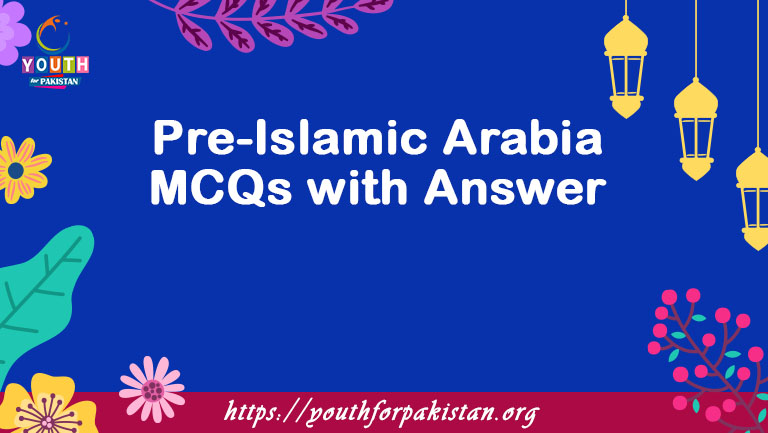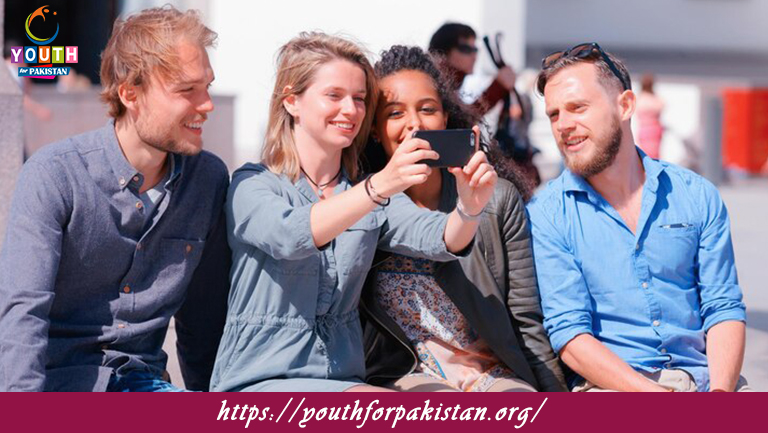The following are Pre-Islamic Arabia MCQs with answers related to Islamic Studies. We have arranged the most important and repeated MCQs in all the competitive examinations. The students can clear their concepts for Pre-Islamic Arabia MCQs online quiz by attempting these.
Pre-Islamic Arabia Online MCQs with Answers
What was the predominant religion in Pre-Islamic Arabia?
A) Christianity
B) Zoroastrianism
C) Polytheism
D) Buddhism
What was the Kaaba used for in Pre-Islamic Arabia?
A) A royal palace
B) A marketplace
C) A place of worship for multiple gods
D) A library
Who was considered the most powerful and influential tribe in Pre-Islamic Arabia?
A) Quraysh
B) Ansar
C) Banu Hashim
D) Banu Thaqif
Which ancient trade route passed through Pre-Islamic Arabia, connecting the Mediterranean to the Indian Ocean?
A) Silk Road
B) Incense Route
C) Spice Route
D) Amber Road
What was the practice of female infanticide in Pre-Islamic Arabia?
A) A common way to strengthen tribes
B) Prohibited and considered a grave sin
C) Practiced exclusively by the Quraysh tribe
D) Encouraged as a form of population control
Who was the famous poet known for his romantic and heroic poetry in Pre-Islamic Arabia?
A) Abu Bakr
B) Abu Lahab
C) Imru al-Qais
D) Umar ibn al-Khattab
What is the Arabic term for the practice of seeking vengeance for a murdered family member in Pre-Islamic Arabia?
A) Jihad
B) Ta’if
C) Qisas
D) Fatwa
Which city was known as a center of trade and culture in Pre-Islamic Arabia?
A) Mecca
B) Taif
C) Yathrib (Medina)
D) Najran
What was the role of the hanifs in Pre-Islamic Arabia?
A) Religious leaders who followed Christianity
B) Warriors who defended their tribes
C) Poets who composed epic stories
D) Philosophers who rejected religion
Which famous well in Mecca is associated with the story of Hagar and Ishmael?
A) Well of Zamzam
B) Well of Badr
C) Well of Safa
D) Well of Marwah
What was the primary source of livelihood for the Bedouin tribes in Pre-Islamic Arabia?
A) Agriculture
B) Fishing
C) Nomadic herding
D) Trade
What was the “Year of the Elephant” in Pre-Islamic Arabia?
A) The year elephants became sacred animals
B) The year of a major drought
C) The year of a famous military invasion
D) The year of a solar eclipse
What was the religious significance of the Black Stone in the Kaaba in Pre-Islamic Arabia?
A) It was believed to have healing powers.
B) It represented the chief god of the Kaaba.
C) It was considered a symbol of wealth.
D) It had no religious significance.
Who was the ruler of the Ethiopian kingdom of Aksum during Pre-Islamic times?
A) Abraha
B) Pharaoh
C) Cyrus the Great
D) Nebuchadnezzar
What was the primary language spoken in Pre-Islamic Arabia?
A) Aramaic
B) Greek
C) Arabic
D) Hebrew
Which major pilgrimage was practiced by Pre-Islamic Arabian tribes even before Islam?
A) Hajj
B) Umrah
C) Qiblah
D) Tawaf
Who was the famous poetess in Pre-Islamic Arabia known for her satirical poetry?
A) Zainab bint Muhammad
B) Fatimah bint Muhammad
C) Asma bint Marwan
D) Khadijah bint Khuwaylid
Which Pre-Islamic Arabian goddess was believed to be the patron of Mecca?
A) Al-Lat
B) Al-Uzza
C) Manat
D) Al-Khansa
What was the role of a “sacrificer” in Pre-Islamic Arabian religious rituals?
A) A person who offered sacrifices to the gods
B) A religious scholar who interpreted dreams
C) A leader of the tribe’s military forces
D) A skilled poet who composed epic tales
Which Pre-Islamic Arabian tribe did the Prophet Muhammad belong to?
A) Banu Quraysh
B) Banu Hashim
C) Banu Thaqif
D) Banu Aws
What was the role of the “poet-warrior” in Pre-Islamic Arabian society?
A) A diplomat who negotiated peace treaties
B) A poet who composed romantic verses
C) A warrior who defended the tribe and its honor
D) A merchant who facilitated trade
What is the term for the practice of blood money to compensate for a crime or injury in Pre-Islamic Arabia?
A) Mahr
B) Diyya
C) Sadaqah
D) Fidyah
Who is the legendary figure in Pre-Islamic Arabian poetry often associated with chivalry and generosity?
A) Abu Sufyan
B) Umar ibn al-Khattab
C) Antar ibn Shaddad
D) Khalid ibn al-Walid
What was the practice of “waqf” in Pre-Islamic Arabia?
A) The pilgrimage to Mecca
B) Donating property or resources to religious or charitable purposes
C) The act of seeking vengeance for a crime
D) The practice of writing poetry
What was the primary material used for writing and inscriptions in Pre-Islamic Arabia?
A) Papyrus
B) Stone
C) Leather
D) Bamboo
What was the primary mode of transportation for Pre-Islamic Arabian nomads?
A) Camels
B) Horses
C) Elephants
D) Donkeys
Which Pre-Islamic Arabian tribe is known for its practice of burying female infants alive?
A) Banu Hashim
B) Banu Thaqif
C) Banu Quraysh
D) Banu Quraizah
What was the primary source of law and justice in Pre-Islamic Arabian society?
A) Tribal customs and traditions
B) Written codes of law
C) The ruler’s decrees
D) Religious scriptures
What is the term for the practice of “mut’a” in Pre-Islamic Arabia?
A) Temporary marriage
B) Pilgrimage to Mecca
C) Polygamy
D) Divorce
What was the role of a “soothsayer” in Pre-Islamic Arabian society?
A) A medical healer
B) A poet who composed satirical verses
C) A person who claimed to predict the future
D) A merchant who traded goods
Who is known as the “Mother of the Poor” in Pre-Islamic Arabian history?
A) Khadijah bint Khuwaylid
B) Fatimah bint Muhammad
C) Aisha bint Abi Bakr
D) Asma bint Marwan
What is the term for the annual truce observed by Pre-Islamic Arabian tribes during the Hajj season?
A) Hudna
B) Ta’if
C) Aman
D) Hudaibiyyah
What was the role of the “judges” in Pre-Islamic Arabian society?
A) Religious leaders who performed rituals
B) Poets who composed praise poetry
C) Individuals who settled disputes and provided legal judgments
D) Traders who facilitated commerce
Which Pre-Islamic Arabian tribe is known for their red-striped flags and military prowess?
A) Banu Hashim
B) Banu Thaqif
C) Banu Umayya
D) Banu Quraizah
What is the term for the custom of burying alive female infants in Pre-Islamic Arabia?
A) Qiblah
B) Ummi
C) Waqf
D) Wa’d
What is the term for the practice of “razzia” or tribal raids in Pre-Islamic Arabia?
A) Ritual sacrifices
B) Pilgrimages
C) Blood feuds
D) Plundering expeditions
What is the name of the Pre-Islamic Arabian tribe known for their expertise in archery?
A) Banu Hashim
B) Banu Thaqif
C) Banu Quraysh
D) Banu Tayy
What was the significance of the “Hajar al-Aswad” (Black Stone) in Pre-Islamic Arabian rituals?
A) It symbolized the tribe’s unity.
B) It was used for divination purposes.
C) It represented the gods of Mecca.
D) It marked the start of the annual pilgrimage.
Which Pre-Islamic Arabian tribe is known for their loyalty to the Prophet Muhammad and his family?
A) Banu Hashim
B) Banu Thaqif
C) Banu Umayya
D) Banu Al-Muttalib
What is the term for the practice of “tahannuth” in Pre-Islamic Arabia?
A) Fasting during Ramadan
B) Seeking blessings from idols
C) Abstaining from war during the sacred months
D) Offering sacrifices to the gods
Who was the famous warrior-poet of Pre-Islamic Arabia known for his romantic poetry and chivalry?
A) Khalid ibn al-Walid
B) Antar ibn Shaddad
C) Abu Sufyan
D) Umar ibn al-Khattab
What is the term for the practice of “niyaba” in Pre-Islamic Arabian society?
A) Intercession by tribal leaders
B) Formal greetings at the Kaaba
C) Fasting during Ramadan
D) Offering sacrifices to the gods
Who was the famous Pre-Islamic Arabian warrior who converted to Islam and played a crucial role in early Islamic conquests?
A) Abu Bakr
B) Khalid ibn al-Walid
C) Umar ibn al-Khattab
D) Abu Sufyan
What was the common form of marriage in Pre-Islamic Arabia?
A) Monogamy
B) Polyandry
C) Polygyny
D) Same-sex marriage
Which ancient civilization had a significant influence on Pre-Islamic Arabian culture, particularly in the southern region of Yemen?
A) Roman Empire
B) Persian Empire
C) Egyptian Empire
D) Sabean Kingdom
What is the term for the practice of “sufism” in Pre-Islamic Arabian spirituality?
A) Asceticism
B) Mysticism
C) Idol worship
D) Polytheism
Which Pre-Islamic Arabian tribe is known for their opposition to the Prophet Muhammad and his mission?
A) Banu Hashim
B) Banu Thaqif
C) Banu Umayya
D) Banu Quraizah
What is the term for the practice of “bay’ah” in Pre-Islamic Arabian tribal society?
A) Declaration of war
B) Allegiance and oath of loyalty
C) Pilgrimage to Mecca
D) Blood feud
Who was the famous Pre-Islamic Arabian poetess known for her elegiac poetry?
A) Khadijah bint Khuwaylid
B) Fatimah bint Muhammad
C) Asma bint Marwan
D) Zainab bint Muhammad
What is the term for the practice of “almsgiving” in Pre-Islamic Arabian society?
A) Sadaqah
B) Zakat
C) Khums
D) Hajj










